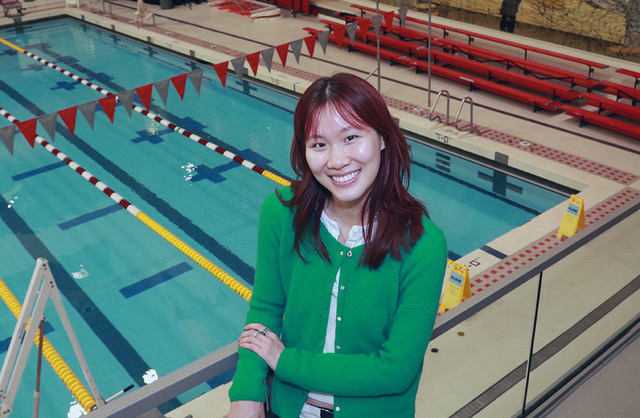PKG Intern Daisy Wang Featured in MIT News!

Photo: Allegra Boverman
Growing up in the Boston suburbs, MIT senior Daisy Wang spent her spare time upside down underwater, dancing with her competitive artistic swimming team.
“It feels like you and your teammates are one unit in the water, moving and working together, and there is an incredible amount of trust involved with all of the lifts and throws,” she said from her dorm room on campus.
From synchronized swimming, Wang learned a valuable lesson about how people are deeply interconnected: One person’s challenge is everyone’s challenge. Many evenings, when Wang isn’t at MIT, she can be found pacing the deck of the very same pool at Cambridge Synchro, where she’s moved into a coaching role on the team.
Wang is an aspiring physician, majoring in biological engineering and minoring in women’s and gender studies. She says what pulls her into both disciplines is a passion for engineering solutions for social problems that have the potential to effect systemic change.
“I am a completely different person in my biological engineering classes and my women’s and gender studies courses,” Wang says. Biological engineering demands creative problem-solving and boundless iteration, while women’s and gender studies requires a different, equally critical skill set, she says.
“From my first WGS.101 class, we have never just read a static text. We apply the texts to our lives and share our personal experiences, looking at the real world through a gender framework,” she says.
Finding ways to benefit society
In fall 2023, Wang’s two academic worlds unexpectedly collided in class 20.380 (Biological Engineering Design), a capstone course in which small groups of undergraduates integrate theoretical knowledge to design hypothetical new products to benefit society.
She explains, “My team wanted to come up with a system that could automatically sense opioid overdose in drug users and administer an emergency treatment of Narcan (naloxone HCI).”
The National Institute on Drug Abuse reported that in 2021, there were 80,411 opioid overdose deaths in the United States. Although Narcan, a drug that rapidly reverses overdose, is increasingly available at major drug stores like CVS, Wang and her colleagues noted that Narcan cannot be self-administered.
Many overdoses take place when users are alone. Wang says, “Narcan works by binding to the opioid receptors and acts as an antagonist. Our idea was to develop a microneedle patch to detect and treat overdose.”
As Wang learned more about the opioid epidemic, she realized that, “Ultimately, new technologies mean nothing if we can’t make them work for the people that need them.”
In her work as an intern in the Health Equity Research Lab at Cambridge Health Alliance, she sees this firsthand in a local hospital system. With funding from the Priscilla King Gray Public Service Center at MIT, Wang is helping a team analyze data regarding the implementation of a mental health survey tool used by clinicians to monitor patients’ symptoms.
She says, “Right now, this is a digital survey tool — and that’s actually a big equity issue. For example, many patients don’t speak English, and some don’t have access to a phone with internet access, which is how the survey is administered.” Wang is digging deeply into both qualitative and quantitative data to make recommendations for improving this tool for the future.
The internship helped her determine that she wants to specialize in implementation science as a physician, studying how evidence-based solutions are translated into practice and made accessible to patient populations.
Tags: PKG Alum, PKG Alumni, Social Impact Internships
